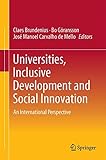Universities, inclusive development and social innovation [electronic resource] : an international perspective / Edited by Claes Brundenius; Bo Göransson; Jose Manoel Carvalho de Mello.
Material type: TextPublication details: Cham, Switzerland : Springer, 2017.Description: 1 online resourceISBN:
TextPublication details: Cham, Switzerland : Springer, 2017.Description: 1 online resourceISBN: - 9783319437002
| Item type | Current library | Call number | Status | Date due | Barcode | |
|---|---|---|---|---|---|---|
| E-Resources | Main Library E-Resources | 305 Un58 (Browse shelf(Opens below)) | Available | E004664 |
Endorsements ; Acknowledgments; Contents; Contributors; Chapter 1: Introduction; References; Chapter 2: Challenges of Rising Inequalities and the Quest for Inclusive and Sustainable Development; Introduction; Rising Inequalities Worldwide: What's the Evidence and What Can Be Done?; The Evidence; Increasing Wealth Concentration Worldwide; Equality vs. Growth: Is There a Trade-Off?; What Can Be Done?; Attempts to Measure "Real Progress"; Why Social Innovation?; On the Origin and Contemporary Definitions of Social Innovation; Social Innovation vs. Inclusive Innovation. Social Innovation and Inclusive Development Also Embrace Refugees Social Innovation and National Innovation Systems; Measuring the Impact of Social Innovation; Social Innovation and Social Entrepreneurship: A Twin Relationship?; The Social Economy and the Third Sector: Alternatives to Capitalism or a Democratized Capitalism?; The Maker Movement and the Change Makers: A New Role for Civil Society; The Sharing Economy: End to Corporate Capitalism or End to the Welfare State?; The Promise of Social Innovation and the Digitalization of the Global Economy. Is Digitalization a Threat to Employment? Democratization of Innovation and the Quest for Inclusive and Sustainable Development; Social Innovations, the Future Challenges, and the Role of Universities; References; Chapter 3: Inclusive Knowledge Policies When Ladders for Development Are Gone: Some Considerations on the Potential Role of Universities; Introduction; Development Today: Neither a Place Nor a Ladder; In Search of Alternative Paradigms for Inclusive Development; Main Trend: From the Humboldtian University to the Entrepreneurial University. Some Southern Features of the Global Model for University Transformation What University for Inclusive Development?; Some Challenges for Developmental Universities; Global Research and Local Needs; Who Governs and for Whom?; A Fundamental Task; Toward a Prospective Approach; References; Chapter 4: Social Development as an Academic Mission of Brazilian Universities: Public Policies and the Case of the Federal University of Rio de Janeiro; Introduction; Social and Inclusive Innovation and the Role of Universities in Socioeconomic Development. Inclusiveness at Higher Education Institutions The Higher Education System: Expansion; The Higher Education System: Present Landscape for Social and Racial Inclusion; Social Inclusion; Ethno-Racial Inclusion; Higher Education System: Policies for Inclusion; Quota System; PROUNI Program; FIES Program; Brazilian Higher Education System: Final Considerations; Social Development at Brazilian Universities; The Extension Program (PROEXT) of the Ministry of Education; The STI Policies for Social Development; The Case of the Federal University of Rio de Janeiro.
This book examines the ways in which universities can play a crucial role in inclusive development, social innovation and social entrepreneurship. It aims to prove the importance of inclusive development and inclusive innovation on economic growth and demonstrate the ways in which universities can be pioneers in this area through initiatives in social responsibility and social innovation. For example, providing access to a university education without discrimination of race, gender, income status, or other factors would help to diminish the increasing income differentials currently being experienced in many countries, especially in the developing world. The research and studies included in this book provide insight into possible actions that can be taken by universities and public and private shareholders in inclusive development, social innovation, social entrepreneurship and overall regional economic and social development. Innovation is currently considered to be the most important and dynamic factor explaining growth and development. At the same time, the traditional view considering innovation as having to be commercialized at any price is being challenged. Lately, there has been growing interest in innovation in the public sector, particularly with respect to social innovations designed to reduce income inequality. To address these concepts, constant exchange of ideas and information between research groups became necessary. UniDev (Universities in Development - the Evolving Role of Academic Institutions in Innovation Systems and Development) is an international research group with researchers in twelve countries interested in the role of universities in development. This book features the results of research performed by eleven research groups from UniDev country communities, presenting in-depth and comparative case studies from universities around the world, including Latin America, Northern and Eastern Europe, and sub-Saharan Africa. This title will be of interest to students, academics, researchers, and policy makers interested in the role of universities in development, social innovation and social entrepreneurship.
There are no comments on this title.

